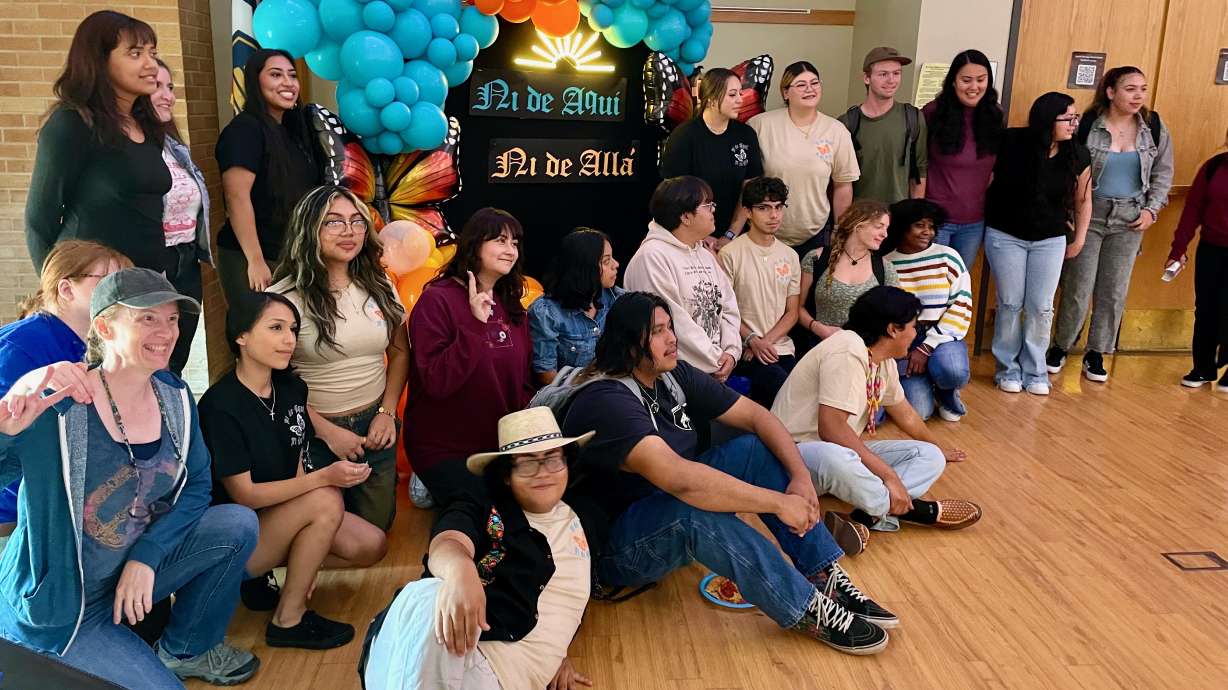Estimated read time: 4-5 minutes
This archived news story is available only for your personal, non-commercial use. Information in the story may be outdated or superseded by additional information. Reading or replaying the story in its archived form does not constitute a republication of the story.
- Salt Lake Community College students gathered for a panel discussion focused on how they balance their U.S. and Latin American roots.
- The students, some born in the United States and some born abroad, shared their experiences of variously feeling culturally connected and culturally disconnected.
- Carolina Bloem, director of SLCC's Center for Latin American Studies, said no one belongs to just one culture, suggesting the students aren't alone in their mixed sentiments.
TAYLORSVILLE — Growing up in St. George and attending a predominantly white high school, Louise Fernandez, the child of immigrants from Latin American, felt she had to "close off parts of myself" to fit in.
Only after enrolling in Salt Lake Community College, with a more diverse population, did that start to change, did she start feeling comfortable embracing her Latino roots.
"It wasn't until I moved up here about 1½ years ago that I can finally embrace, completely, who I am and where my parents are from and the language I speak and the way that I grew up as a child," said Fernandez.
Still, she went on, "it's an ongoing process." While she was born in California, her dad is originally from Mexico, and her mom is from Honduras.
Uprooting from abroad as a child to move to the United States, or being the U.S.-born child of immigrants, can be fraught with complications. Fernandez and several other Latino Salt Lake Community College Students addressed the conundrum during a panel discussion on Tuesday, noting the mixed feelings that can come with having feet in two cultures, wondering whether either one is an appropriate fit.
"A lot of people, when it comes to being told you're not from here, not from there, you often get very discouraged. You feel you're not part of the culture. You feel like you don't belong anywhere," said SLCC student Fernando Rodriguez Camarena.
He helped organize Tuesday's discussion, titled "Ni de Aquí, Ni de Allá" in Spanish or, in English, "Not from Here, Not from There." The panel discussion was tied to Hispanic Heritage Month, which goes from Sept. 15 to Oct. 15, and the focus was on SLCC's sizable Latino population, about a quarter of the college's student body.

Carolina Bloem, director of SLCC's Center for Latin American Studies and moderator of Tuesday's activities, said no one belongs to just one culture, suggesting U.S. Latinos with roots in other countries aren't alone in contending with a cultural balancing act. "A lot of us struggle among different cultures constantly, sometimes even without thinking about it," she said.
Moreover, even if you identify with a certain culture, you shouldn't feel restricted in how you act.
"Let's keep in mind that identities are not prescriptive," Bloem said. "In that sense, you do not owe it to anybody to be the type of anything that someone expects out of you. So as part of living your life, hopefully you will come to terms with being you the way you feel comfortable being you, beyond these labels."
'A huge disconnect with my culture'
Regardless, the students speaking out Tuesday noted the pressures they can face in contending with their Latino roots.
Read more:
Eric Zavala, another SLCC student, grew up in a largely white locale — Spanish Fork — and, as a teen, didn't feel connected to his Mexican roots. His parents are immigrants from Mexico while he was born in Utah.
Men in Mexico, Zavala said, "are supposed to be very rough, very strong, very hardworking, and they don't really show a lot of emotion," he said. "And I grew up the opposite, and that felt like a huge disconnect with my culture because my dad would always tell me, 'If you really were a Mexican, you would be the opposite of who you are.' That really hurt."
He would try to explain himself, with limited success, telling his dad that he's "growing up in a different time period and culture." Finally, he came to the realization that he's a hybrid. The Mexican lineage from his parents is "a part of myself, but not entirely who I am. I am a blend of multiple cultures, and that makes me happy," he said.

Citlaly Guzmán De La Rosa, whose parents are immigrants from Mexico though she was born in Utah, said she feels "very connected to my culture." At the same time, she noted the diversity of culture in Mexico. Just because "you don't fit the criteria" of what some think being Mexican is supposed to be, she said, doesn't mean "that you're not connected."
Tracy Fraatz, a SLCC student with roots in Guatemala and Peru, said she always felt "kind of like an outsider" living in various parts of Latin America growing up. Moving to the United States when she was 15, she learned for the first time that she was "a person of color," which in a way helped strengthen the connection she felt with Latin America.
"I feel like moving to the U.S. and now just being like a minority-minority, I did connect more with my culture because I felt more relieved, more comfort from my culture in that way than when I was living in Guatemala or other places," she said.










